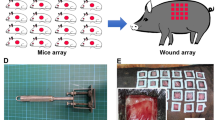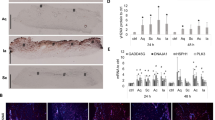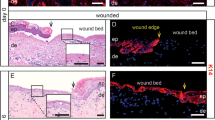Abstract
THE benefits of special dressings versus air exposure of cutaneous wounds has long been debated. Winter and Scales1,2 have recently added fresh insight into the problem. In the domestic pig they demonstrated that an occlusive dressing doubles the rate of wound re-epithelization when compared with wounds exposed to the air. In this communication we report parallel studies performed in man.
This is a preview of subscription content, access via your institution
Access options
Subscribe to this journal
Receive 51 print issues and online access
$199.00 per year
only $3.90 per issue
Buy this article
- Purchase on Springer Link
- Instant access to full article PDF
Prices may be subject to local taxes which are calculated during checkout
Similar content being viewed by others
References
Winter, G. D., Nature, 193, 293 (1962).
Winter, G. D., and Scales, J. T., Nature, 197, 91 (1963).
Author information
Authors and Affiliations
Rights and permissions
About this article
Cite this article
HINMAN, C., MAIBACH, H. Effect of Air Exposure and Occlusion on Experimental Human Skin Wounds. Nature 200, 377–378 (1963). https://doi.org/10.1038/200377a0
Issue Date:
DOI: https://doi.org/10.1038/200377a0
This article is cited by
-
3 M antimicrobial incise drape combined with MEBO in wound recovery of postoperative hypospadias surgery
International Urology and Nephrology (2024)
-
Evaluation of Polyethylene Surgical Drape as an Alternative Wound Dressing Material, Compared to Banana Leaf (Musa paradisiaca) Dressing in Facial Abrasions
Journal of Maxillofacial and Oral Surgery (2020)
-
Evaluation of an Electro-Pneumatic Device for Artificial Capillary Pulse Generation used in a Prospective Study in Animals for Surgical Neck Wound Healing
Scientific Reports (2019)
-
Incorporation of lipid nanosystems containing omega-3 fatty acids and resveratrol in textile substrates for wound healing and anti-inflammatory applications
SN Applied Sciences (2019)
-
A novel method to prepare three-component hydrogels as neural tissue engineering
Polymer Bulletin (2019)
Comments
By submitting a comment you agree to abide by our Terms and Community Guidelines. If you find something abusive or that does not comply with our terms or guidelines please flag it as inappropriate.



